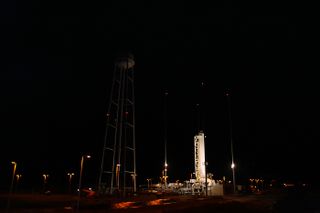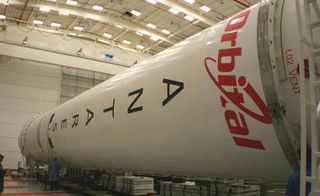Private Spacecraft Builder to Test-Fire Rocket Engine Tonight

A commercial spaceflight company is counting down to a key rocket engine test in Virginia tonight (Feb. 22) for a new private rocket designed for space station missions.
The Virginia-based company Orbital Sciences Corp. is expected to test-fire the first stage engines of its new Antares rocket at the Mid-Atlantic Regional Spaceport on Wallops Island, Va., between 6 p.m. and 9 p.m. EST (2300 and 0200 GMT). NASA's Wallops Flight Facility, also based on the island, is supporting the so-called static fire engine test, in which the Antares rocket will fire its engines without leaving the launch pad.
"The test is a key milestone leading up to the first flight of the Antares rocket, which is preliminarily scheduled for about four to six weeks following the completion of the engine test," NASA Wallops officials said in a statement.
Orbital Sciences is one of two private spaceflight companies with billion-dollar NASA contracts to provide unmanned cargo delivery missions to the International Space Station. Under its $1.9 billion contract, Orbital Sciences will make at least eight delivery flights to the space station using its Antares rocket and robotic Cygnus spacecraft. The first Antares rocket test flight is expected later this year. [Antares Rocket and Cygnus Explained (Infographic)]
The Hawthorne, Calif.-based Space Exploration Technologies (SpaceX) is the other company with a NASA contract for unmanned space station deliveries. SpaceX has a $1.6 billion contract to fly at least 12 missions to the space station using its Dragon space capsules and Falcon 9 rocket. The company launched both a test flight and a bona fide delivery mission to the space station in 2012. The second delivery flight under the contract is slated to launch on March 1.
With NASA's retirement of the space shuttle fleet in 2011, the space agency is relying on new private rockets and spacecraft to ferry cargo — and eventually astronauts — to and from low-Earth orbit. NASA is currently dependent on Russia, Europe and Japan for cargo deliveries to the space station. Russia's Soyuz spacecraft are the only vehicles currently available to ferry astronauts to and from the station.
Orbital's engine test tonight will mark the company's second attempt to check the Antares rocket's dual AJ26 rocket engines, which are designed to provide 680,000 pounds of thrust. A first attempt on Feb. 13 was aborted before engine ignition due to a "low pressurization" detection during a nitrogen purge in the rocket's aft engine compartment, Orbital officials said in an update.
Get the Space.com Newsletter
Breaking space news, the latest updates on rocket launches, skywatching events and more!

Tonight's Antares engine test will take place at Pad-0A at the Mid-Atlantic Regional Spaceport, which is located on the eastern shore of Virginia. If all goes well, the test will set the stage for a full-up flight test of the Antares rocket, and then a demonstration flight as part of Orbital's contract under NASAs' Commercial Orbital Transportation Services (COTS) program.
"Following the successful completion of the COTS demonstration mission to the station, Orbital will begin regular cargo resupply flights to the orbiting laboratory through NASA's Commercial Resupply Services contract," NASA Wallops officials said.
Tonight's Antares rocket engine test will be visible and audible in the Wallops Island, Va., area. If you snap a photo of the engine test and want to share it with SPACE.com, send images, comments and location information to managing editor Tariq Malik at spacephotos@space.com.
You can follow SPACE.com Managing Editor Tariq Malik on Twitter @tariqjmalik. Follow SPACE.com on Twitter @Spacedotcom. We're also on Facebook & Google+.
Join our Space Forums to keep talking space on the latest missions, night sky and more! And if you have a news tip, correction or comment, let us know at: community@space.com.

Tariq is the Editor-in-Chief of Space.com and joined the team in 2001, first as an intern and staff writer, and later as an editor. He covers human spaceflight, exploration and space science, as well as skywatching and entertainment. He became Space.com's Managing Editor in 2009 and Editor-in-Chief in 2019. Before joining Space.com, Tariq was a staff reporter for The Los Angeles Times covering education and city beats in La Habra, Fullerton and Huntington Beach. In October 2022, Tariq received the Harry Kolcum Award for excellence in space reporting from the National Space Club Florida Committee. He is also an Eagle Scout (yes, he has the Space Exploration merit badge) and went to Space Camp four times as a kid and a fifth time as an adult. He has journalism degrees from the University of Southern California and New York University. You can find Tariq at Space.com and as the co-host to the This Week In Space podcast with space historian Rod Pyle on the TWiT network. To see his latest project, you can follow Tariq on Twitter @tariqjmalik.
